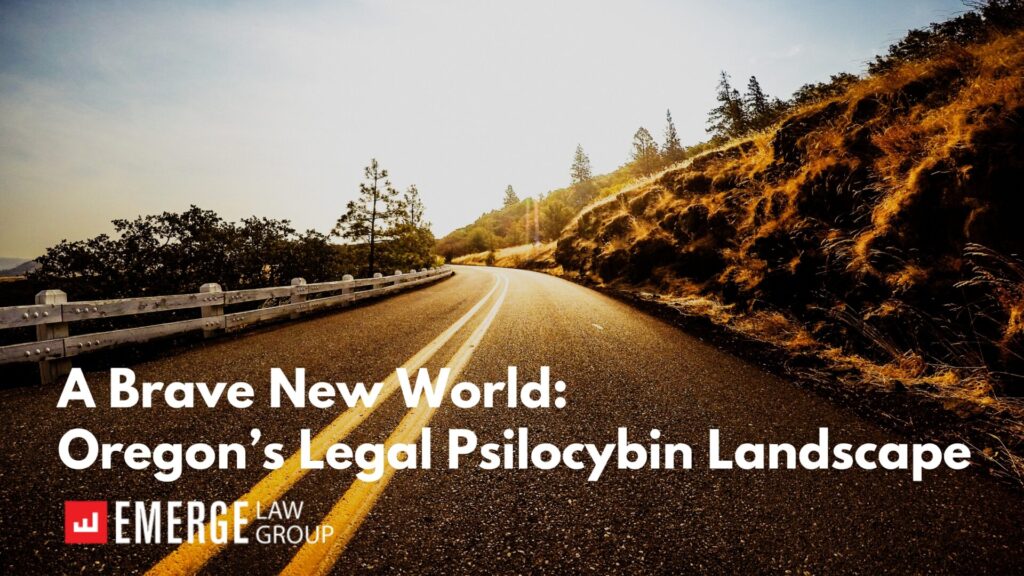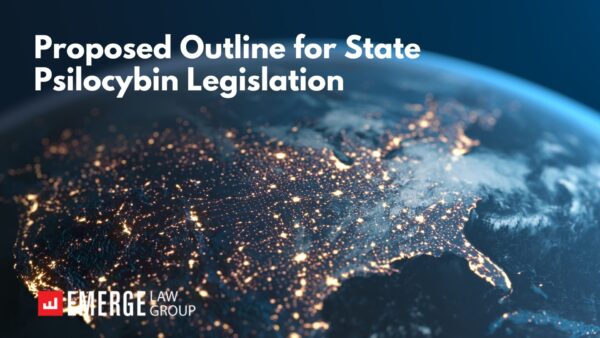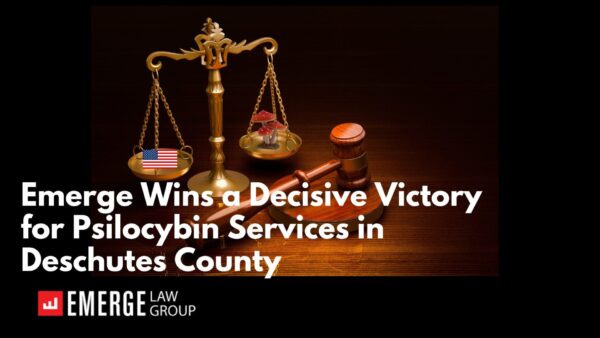Authors: Dave Kopilak and Kaci Hohmann
This article first appeared in the Oregon State Bar Business Law Section Newsletter • March 2023
On Election Day 2020, Oregonians approved Ballot Measure 109, also known as the Oregon Psilocybin Services Act (the Act). It created the nation’s first legal, regulatory framework for the manufacture, sale, and consumption of psilocybin products and the provision of psilocybin services. The Oregon Health Authority (OHA) is the regulating agency.
General framework
Under the Act, clients may purchase, consume, and experience the effects of psilocybin products only at a licensed service center and only under the supervision of a licensed facilitator.
The Act provides for three types of sessions between the client and a licensed facilitator: a preparation session, an administration session, and an integration session. The preparation session is an intake meeting that must occur before the client can participate in an administration session. In the administration session, the client consumes and experiences the effects of a psilocybin product. In the integration session, which is optional on the client’s part, the client and facilitator can discuss the client’s psilocybin experience and how the client may derive lasting meaning from the experience. Group administration sessions are permitted, as are outdoor administration sessions.
The Act provides for four license types: manufacturer, service center operator, facilitator, and laboratory. A manufacturing license includes cultivation, harvesting, production, and processing. A facilitator license applies to an individual, whereas the other licenses could be held by legal entities.
One of the most striking aspects of the Act is its non-medical nature. Although a medical or mental health condition may be the reason a client seeks a psilocybin experience, the Act does not require a client to be diagnosed with or have any particular medical condition to participate. Any client who is eligible can participate for any reason, or for no particular reason at all.
Similarly, the Act expressly provides that the OHA cannot require a facilitator to have a degree from an institution of higher learning. A facilitator must have a high-school diploma or equivalent and must complete a 160-hour education and training program. No further education nor additional professional licenses are required. In fact, the OHA promulgated a rule that prohibits facilitators who hold other professional licenses from practicing their other professions while providing psilocybin services.
The current status
The Act provided for a two-year development period to give the OHA sufficient time to educate itself about psilocybin, to provide information about psilocybin to the public, and to adopt rules. The two-year development period expired on December 31, 2022. After many meetings, many public comments, and much work, the OHA adopted its final set of rules on December 27, 2022, and began to accept applications for licenses on January 2, 2023.
As of March 3, 2023, the OHA had received 13 manufacturer applications, six service center applications, zero facilitator applications, and two laboratory applications, but had not yet issued any licenses. There are currently 20 approved facilitator training programs, but the facilitators in those programs have not yet completed their courses. Individuals likely will begin to apply for facilitator licenses over the next few months.
Colorado and other states
On Election Day 2022, Colorado voters approved Colorado Proposition 122, which provides for a similar (yet more expansive) regulatory framework for psilocybin products and services. Colorado will not begin accepting license applications under Proposition 122 until September 30, 2024, and thus Oregon will be the first state in the country to issue psilocybin licenses to businesses and individuals.
A number of other states are considering various forms of legalization, and it is likely that more states will join Oregon and Colorado over the next few years.
Federal illegality
Like marijuana, psilocybin is classified as a Schedule I controlled substance under the federal Controlled Substances Act. Consequently, just as is the case with marijuana businesses licensed by the Oregon Liquor and Cannabis Commission, any psilocybin business that manufactures, distributes, dispenses, or possesses psilocybin will be in violation of federal law.
Over the years, the United States Department of Justice (US DOJ) made a number of public pronouncements about its enforcement policies concerning marijuana. Probably the most influential of those was an August 29, 2013, document that came to be known as the “Cole Memo” after its author James Cole, who was the Deputy Attorney General at the US DOJ. The Cole Memo was released in response to Colorado and Washington adopting the first adult-use marijuana laws in 2012, and essentially indicated that the US DOJ would take a hands-off approach when it came to state laws that legalized marijuana, so long as such laws provided for strong and effective regulatory and enforcement systems.
The Cole Memo was rescinded on January 4, 2018, by then-United States Attorney General Jeff Sessions, who declared that it was unnecessary, as the US DOJ already had well-established enforcement principles that govern all federal prosecutions. A final public pronouncement was made by the United States Attorney for the District of Oregon (OR DOJ), in a memorandum released on May 18, 2018. That document, which came to be known as the “Williams Memo” after its author, Billy Williams, looked awfully similar to the Cole Memo. For all intents and purposes, the Williams Memo restated the US DOJ’s enforcement policies in the State of Oregon concerning marijuana that were initially laid out in the Cole Memo. The Williams Memo has never been updated or repealed, and presumably remains in effect.
So far, neither the US DOJ nor the OR DOJ has made any public statements about the Act, Colorado’s Proposition 122, or state-regulated psilocybin programs in general. Although one might logically apply (or extend) the Williams Memo to psilocybin within the State of Oregon, there is no guarantee that the US DOJ or the OR DOJ will take any particular course of action. It appears they are taking a “wait and see” approach at the moment. However, anything is possible.
Legal issues for psilocybin businesses
Oregon attorneys who represent psilocybin businesses under the Act will encounter many of the same legal issues that attorneys encounter when representing marijuana businesses. However, with respect to nearly all of those issues, there will be nuanced differences, most of which will make things even more challenging for psilocybin businesses and their attorneys.
Aside from the everyday legal issues that all businesses and attorneys encounter, the following is a list of some of the most important legal issues for psilocybin businesses.
Federal illegality with no federal guidance
The lack of federal guidance may warrant special care when it comes to securities law disclosures, entity organization documents, leases, and other contracts.
Banking
The lack of any federal guidance will likely ensure that banks or financial institutions will not openly and knowingly provide banking services to psilocybin businesses, at least for a while.
Section 280E of the Internal Revenue Code
Section 280E prohibits any business trafficking in a Schedule I or Schedule II controlled substance under the federal Controlled Substances Act from deducting any business expenses. In lieu of taking deductions, trafficking businesses can adjust their gross income downward by their cost of goods sold (COGS) to arrive at their taxable income. COGS are the direct costs incurred by a business to acquire or manufacture merchandise. State-regulated marijuana business have been dealing with Section 280E from the outset, and it has always been troublesome. However, Section 280E may have more extreme effects on service center operators (and potentially facilitators) because the “services” component of the Act is so significant. Services are not merchandise. Consequently, none of the service-related expenses incurred by a service center can be categorized as COGS.
Land use
The Act allowed cities and counties to submit ordinances that prohibit manufacturing or service centers in their jurisdiction to their voters for approval in statewide general elections. In November 2022, voters in some jurisdictions did in fact prohibit manufacturing and service centers. However, most of the densely populated areas in Oregon allow all psilocybin businesses. A map of the jurisdictions that have permitted or prohibited psilocybin businesses is provided in a Local Jurisdiction Tracker. Those jurisdictions are now promulgating time, place, and manner restrictions, or grappling with how psilocybin businesses—especially service centers—fit within their existing land-use ordinances. Before leasing or purchasing real property, it is fundamental for a psilocybin business to understand those local ordinances.
OHA rules
The OHA’s final rules implementing the Act are detailed and voluminous. The sheer amount of paperwork involved in providing services to a client is rather astounding. Regulatory compliance will be essential.
Client agreements
In the ordinary course of business, cannabis retailers do not enter into agreements with their customers. However, service-center operators and facilitators almost certainly will be entering into detailed agreements with their clients. They will want to have robust warranty disclaimers, releases, and liability waivers in their client agreements—especially if professional liability insurance for psilocybin services is prohibitively expensive.
Residency requirements
The Act requires that one or more Oregon residents must have more than 50% of the ownership interests of any legal entity that will hold a manufacturer or service center license. Additionally, all facilitators must be Oregon residents. The residency requirements expire on January 1, 2025.
Trademarks
As a result of federal illegality, the United States Patent and Trademark Office will not issue federal trademarks for any psilocybin products. An argument could be made that a facilitator who provides psilocybin services (and nothing more) is not federally illegal, because the facilitator is not manufacturing, distributing, dispensing, possessing, or even touching any psilocybin.
Consequently, federal trademark viability needs to be considered on a case-by-case basis. There are often numerous creative solutions to protect intellectual property even in the absence of federal trademarks.
Ethics
Following the legalization of marijuana in Oregon, Oregon Rules of Professional Conduct (ORPC) Rule 1.2(d) was adopted to make it expressly clear that Oregon lawyers are permitted to counsel and assist clients regarding Oregon’s marijuana-related laws. In 2022, the Oregon State Bar (OSB) Cannabis and Psychedelics Law Section submitted a formal request to the OSB Legal Ethics Committee to amend ORPC Rule 1.2(d) to permit Oregon lawyers to counsel and assist clients regarding any state and local laws that may be illegal under federal or tribal law. As of the date of this article, the proposed amendment has not been approved.
The road ahead
Oregon’s psilocybin program is in its infancy and as such, there are still many unknowns. Currently, the number of psilocybin licensee applications is small, resulting in a much slower rollout than what we saw in the early days of Oregon’s marijuana industry. As Oregon’s psilocybin ecosystem matures, we hope to see a thriving, inclusive, and sustainable program.




